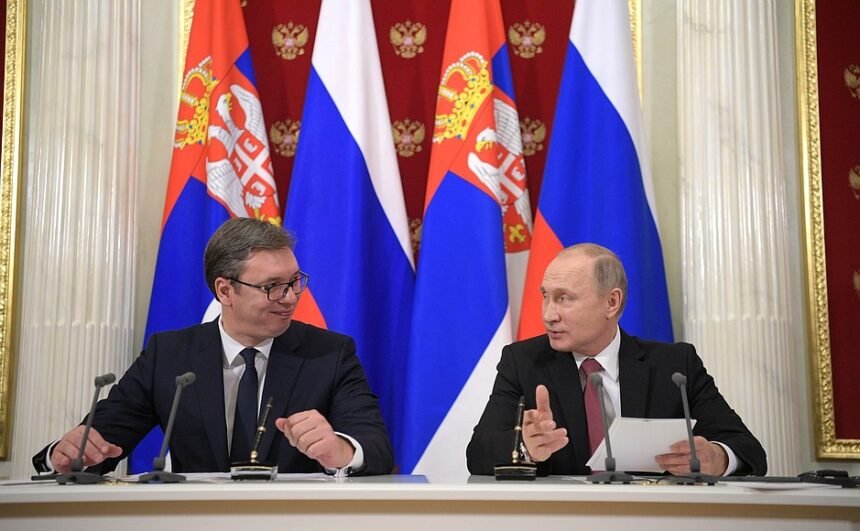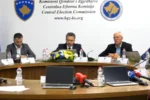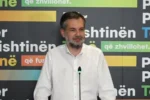Amidst massive protests against the Serbian Government and citizens’ demands for early elections, Serbian President Aleksandar Vučić once again turned to Russia.
On June 30, Vučić thanked his “Russian friends” – as he called Moscow’s leadership – for their “understanding.” This was his response to Russian Foreign Minister Sergey Lavrov’s statement that Moscow is interested in resolving the unrest in Serbia “in accordance with the Constitution and laws.”
However, on the same day, Aleksandar Dugin, a well-known Kremlin ideologist and close associate of President Vladimir Putin, declared that the people of Serbia “no longer want Vučić.”
“Serbs want Vučić gone. And this is true. All Serbs want this,” Dugin told the Russian state media outlet, Sputnik.
These contradictory messages from Moscow come seven days after Russia’s Foreign Intelligence Service published a statement claiming that Serbia, through intermediary channels, is exporting weapons to Ukraine – a country Russia fully invaded in February 2022.
Is the Friendship Breaking?
Ivana Stradner, an analyst at the Foundation for Defense of Democracies in Washington, does not believe there is any breakdown in relations between Vučić and Russia. According to her, the Kremlin supports Vučić because they “can control him.”
“Moscow is not interested in a democratic and unpredictable government in Serbia,” Stradner told Radio Free Europe (RFE/RL). She added that Russia has historically promoted autocracy and is using the same tactics in Serbia as in Georgia.
In his statement, Lavrov also warned about the possibility of a “color revolution” in Serbia, accusing Western states of “usually trying to exploit internal situations to promote their interests, to the detriment of other partners.”
“We hope that this time they will not get involved in color revolutions,” Lavrov said, using the term the Kremlin associates with the overthrow of authoritarian regimes through externally supported civic movements. Vučić, since the beginning of the protests, has been claiming the same – that a “color revolution” is being attempted in Serbia.
Praise in Times of Crisis
The reciprocal statements between Moscow and Belgrade were made on a day when massive road blockades were organized across Serbia as a form of civil disobedience. This was a reaction to arrests following clashes between police and protesters on June 28 in Belgrade, during protests announced by both supporters and opponents of the Government.
Police responded to protesters with arrests and dispersal of blockades, while protesters accused them of using excessive force. They are demanding early parliamentary elections, a request the Government rejects.
“The repressive measures of this government remind me of Moscow a decade ago during the protests there. It is a manual for authoritarian regimes,” Ivana Stradner assessed.
Vučić, defending police actions, used the same phrase as Lavrov – “in accordance with the Constitution and the law” – calling police actions “completely professional.”
“I would not be surprised if Russia strengthens its intelligence activities and increases support for the government in Serbia,” Stradner warned RFE/RL.
Vučić’s “Apology” to Moscow
According to Andrey Shary, director of RFE/RL’s Russian Service, Vučić’s thanks to Lavrov and Moscow are in fact “a form of apology and servility towards the Kremlin.”
He recalled that these thanks came after the Russian intelligence service published a report that Serbia was sending weapons to Ukraine through intermediaries – claims the Kremlin used to rebuke Belgrade. Initially, Vučić denied these accusations, but later admitted he could not control where the ammunition ended up. On June 23, Serbia announced the suspension of arms exports.
On Whose Behalf Does Dugin Speak?
In addition to Lavrov and “Russian friends,” Vučić also thanked “rare impartial Russian analysts.” However, one of them, Aleksandar Dugin, known for his ties to the Kremlin, sharply criticized him.
“Vučić’s legitimacy has ended,” Dugin told Sputnik, adding that “all Serbs want his departure.” According to him, Vučić is currently supported only by the state, while “popular support is zero.”
Dugin also used the term “color revolution,” saying that “only those who fear such a revolution are not participating in protests.” According to him, “the end has come for Vučić.”
Stradner says Dugin’s comments “should not be given too much importance,” as he does not have as much influence on Putin as believed. However, the director of RFE/RL’s Russian Service, Shary, thinks Dugin’s statements are more significant than Lavrov’s public ones.
“The Kremlin uses Dugin whenever it wants to send a message from the right wing that it cannot officially say itself. Lavrov would never say this publicly,” he says.
According to Shary, the fact that Dugin spoke to a media outlet directly controlled by the Kremlin is no coincidence. “This shows that Dugin received permission, a signal from Moscow, to say this. It’s how the Kremlin puts pressure on Vučić,” he says. And, he adds, if Vučić does not understand the message, the pressure could increase.
“Today Dugin says it, tomorrow another analyst might say it. The day after tomorrow it could become Moscow’s official position. And this for Vučić, who tries to balance between Europe and Russia, is serious,” Shary assessed.
Stradner says that Vučić’s balancing act “is not something Moscow wants to tolerate, unlike Brussels.” She recalls Serbia’s dependence on Russian gas and oil. While Serbia is trying to postpone US sanctions against the Oil Industry of Serbia, most of which is Russian-owned, it is negotiating with Moscow for a new gas supply agreement.
“Putin might be bothered by arms exports to Ukraine, but if Russia loses the gas market, it also loses influence. That’s why they are sending messages,” she assessed.
Telegram, a Propaganda Tool
According to Shary, another tool for spreading Russian propaganda is the social network Telegram, where hundreds of pro-Russian channels are active in Serbia, some with tens of thousands of followers. In recent days, some of them reported on road blockades in Belgrade and other cities, often just with the location, without much other information. Meanwhile, other Telegram channels expressed support for Vučić, but there was also criticism against him from pro-Russian mercenaries fighting in Ukraine, including Dejan Berić, a Serbian sniper convicted for participating in foreign wars. Berić openly criticized Vučić for meeting with Ukrainian President Volodymyr Zelensky and for the accusations regarding ammunition exports to Kyiv.
“The Russian government and Putin are using Telegram for propaganda, as they have lost other platforms due to sanctions,” Shary says. He emphasized that unofficial channels are how the Kremlin sends messages to Belgrade to “be careful what it does.”
“Victory” Over “Color Revolution”
For months, Vučić has claimed to have “defeated the color revolution” and refuses to fulfill the protesters’ demands, which spread after the tragedy in Novi Sad, where 16 people died from the collapse of the train station roof. Protesters linked the tragedy to corruption in the station’s reconstruction project, which the Government had promoted as a success.
On June 30, Vučić said that power is gained through elections, “when competent bodies announce them, not when a gang of hooligans demands it.”
“We will defend order in the country. Thank you to our Russian friends for their understanding and attention to what is happening in Serbia,” Vučić said. “But, I want to tell them and everyone: no matter how much they organize and pay… this is over. I want to inform them that Serbia has won and I look forward to continuing cooperation with the Russian Federation,” Vučić concluded.







